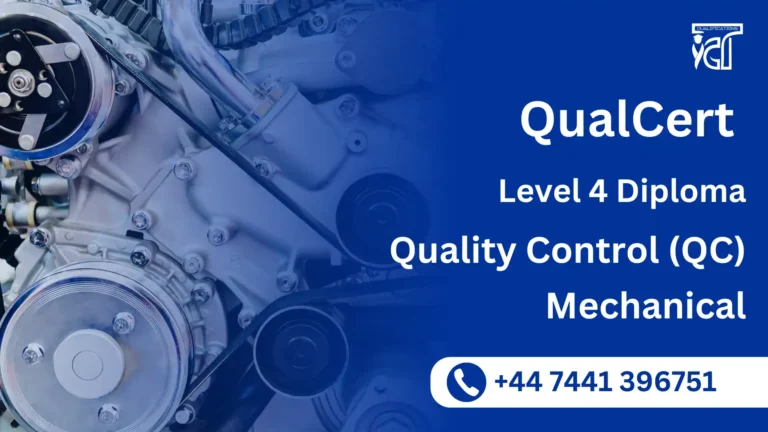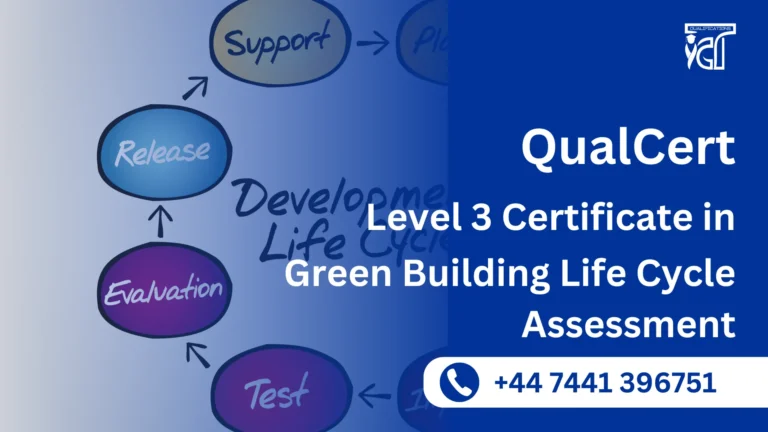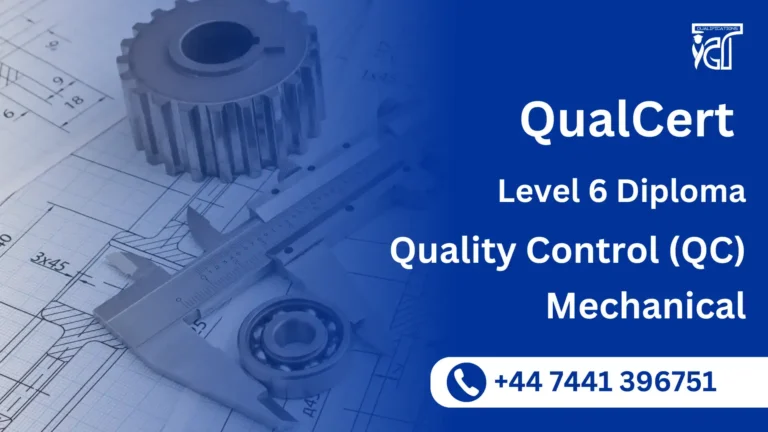The QualCert Level 5 Diploma in Quality Control (QC) Mechanical is a vocationally-oriented qualification designed to provide learners with a solid foundation in mechanical quality control systems, procedures, and industry standards. This diploma is ideal for individuals seeking to develop practical skills and theoretical knowledge to ensure quality, safety, and compliance in mechanical engineering environments.
The course focuses on core quality control principles, including inspection techniques, material testing, mechanical drawings interpretation, documentation, and regulatory compliance. It equips learners with the tools needed to perform accurate inspections, implement quality assurance processes, and contribute to the efficiency and reliability of mechanical systems in industries such as manufacturing, construction, oil & gas, and power generation.
Whether you’re a new entrant to the quality control field or a technician aiming to formalize and advance your knowledge, this program offers a strong platform for career development. Upon completion, learners will be well-prepared to take on roles such as QC Inspector, Mechanical Technician, or QA Assistant, and can progress to higher-level qualifications in quality management or mechanical engineering.
QualCert Level 5 Diploma in Quality Control (QC) Mechanical
The QualCert Level 5 Diploma in Quality Control ( QC ) Mechanical comprises several study units designed to provide learners with a comprehensive understanding of QC principles and practices in the mechanical sector. Below is the qualification structure, including the Total Qualification Time (TQT) 600, Guided Learning Hours (GLH) 360, and 75 Credits associated with the program.
| Unit Ref# | Unit Title | Credit | GLH | TQT |
| QC12011 – 1 | Advanced Inspection and Testing Strategies in Mechanical QC | 15 | 60 | 100 |
| QC12011 – 2 | Failure Analysis and Lifecycle Management in Mechanical Systems | 15 | 60 | 100 |
| QC12011 – 3 | Integration of AI and Machine Learning in QC | 15 | 60 | 100 |
| QC12011 – 4 | Advanced Statistical Process Control (SPC) and Data Analytics | 15 | 60 | 100 |
| QC12011 – 5 | Sustainability and Environmental Standards in Mechanical QC | 15 | 60 | 100 |
| QC12011 – 6 | International Mechanical QC Standards and Industry Best Practices | 15 | 60 | 100 |
GLH (Guided Learning Hours) and TQT (Total Qualification Time) are terms commonly used in vocational qualifications to help define the amount of time a learner is expected to spend on their studies.
1. GLH (Guided Learning Hours)
GLH refers to the number of hours a learner spends being directly taught, supervised, or supported during their course. This includes the time spent in activities such as:
- Classroom instruction
- Practical workshops
- One-on-one tutoring or mentoring sessions
- Online learning sessions with tutor support
In other words, GLH represents the time that learners are actively engaged with their instructors or learning activities.
2. TQT (Total Qualification Time)
TQT represents the total amount of time a learner is expected to invest in completing a qualification, including:
- GLH (Guided Learning Hours): Time spent on direct learning, as explained above.
- Self-Directed Learning: This includes time spent on independent study, research, assignment completion, preparation for exams, and any other work the learner does outside of direct teaching hours.
TQT is a broader measure that includes all the time required to achieve the qualification. It helps learners and employers understand the overall commitment required for the qualification.
Key Differences Between GLH and TQT:
- GLH focuses on direct learning with guidance or supervision.
- TQT includes GLH as well as independent study time and other learning-related activities.
Example:
If a qualification has a TQT of 600 hours and a GLH of 250 hours, it means the learner should spend 250 hours in direct learning (classroom, online, or tutor-led sessions) and 350 hours on independent study or research.
Advanced Inspection and Testing Strategies in Mechanical QC
- Implement advanced inspection techniques to enhance mechanical quality control.
- Utilize precision testing equipment for defect detection and performance evaluation.
- Develop comprehensive testing protocols to ensure product reliability and compliance.
Failure Analysis and Lifecycle Management in Mechanical Systems
- Conduct in-depth failure analysis to determine the root causes of mechanical failures.
- Apply lifecycle management strategies to improve the longevity of mechanical components.
- Develop preventive maintenance plans to minimize failures and enhance system efficiency.
Integration of AI and Machine Learning in QC
- Understand the role of artificial intelligence and machine learning in modern quality control.
- Utilize AI-driven predictive analytics for defect detection and process optimization.
- Implement machine learning models to enhance quality assurance and decision-making.
Advanced Statistical Process Control (SPC) and Data Analytics
- Apply advanced statistical techniques to monitor and improve mechanical processes.
- Use data analytics tools for real-time quality assessment and defect prevention.
- Interpret SPC charts and process capability indices to enhance manufacturing efficiency.
Sustainability and Environmental Standards in Mechanical QC
- Understand the impact of sustainability in mechanical quality control practices.
- Ensure compliance with environmental regulations and eco-friendly manufacturing processes.
- Implement sustainable QC strategies to minimize waste and resource consumption.
International Mechanical QC Standards and Industry Best Practices
- Interpret and apply international mechanical QC standards such as ISO 9001 and ISO 16949.
- Align quality control processes with global industry best practices and regulatory requirements.
- Develop strategies to maintain consistent product quality in a competitive market.
Course Benefits: QualCert Level 5 Diploma in Quality Control (QC) Mechanical
The QualCert Level 5 Diploma in Quality Control (QC) Mechanical offers a wide range of professional and practical benefits for individuals aiming to build a successful career in mechanical quality assurance and inspection. Below are the key advantages of completing this qualification:
- Solid Foundation in QC Practices
Gain essential knowledge of quality control methods, inspection techniques, and industry standards used in mechanical engineering and production environments. - Career Opportunities in QC/QA Fields
Qualify for entry- to mid-level roles such as Mechanical QC Inspector, QA Technician, Process Controller, or Quality Assurance Assistant in industries like manufacturing, oil & gas, and construction. - Hands-On Practical Skills
Learn to conduct inspections, perform material testing, interpret mechanical drawings, and use measuring tools and instruments effectively in real-world settings. - Industry-Relevant Curriculum
The course content is aligned with current industry demands and quality standards (such as ISO, ASME, API), making your skills immediately applicable and market-ready. - Recognition and Credibility
Earn a respected qualification that enhances your professional profile and demonstrates your commitment to maintaining high-quality standards in engineering processes. - Pathway to Higher Qualifications
Use this diploma as a stepping stone to progress to Level 6 or Level 7 diplomas in Quality Control or related fields, or pursue specialized certifications in inspection and quality auditing. - Improved Workplace Performance
Apply your knowledge to reduce defects, improve safety, and support continuous improvement initiatives in your organization. - Increased Employability
With a focus on both theory and practical application, this diploma prepares you to meet the expectations of employers in a wide range of mechanical industries. - Suitable for a Wide Range of Learners
Whether you’re starting a new career in QC or already working in a technical role and looking to upskill, this course caters to diverse professional backgrounds. - Flexible Learning Options
Designed to accommodate both full-time learners and working professionals, the program allows flexible study pathways without compromising quality.
This diploma empowers learners with the competence and confidence to ensure mechanical systems meet rigorous quality, performance, and safety standards in competitive engineering environments.
Ideal Learner for QualCert Level 5 Diploma in Quality Control (QC) Mechanical
The ideal learner for the QualCert Level 5 Diploma in Quality Control (QC) Mechanical is someone who is passionate about mechanical systems and committed to ensuring quality, safety, and efficiency in engineering and industrial environments. This course is suitable for:
- Junior QC/QA Professionals
Individuals currently working in entry-level quality control or assurance roles who want to formalize their skills and move up in their careers. - Mechanical Technicians and Assistants
Technically skilled workers seeking to enhance their understanding of inspection processes, quality standards, and documentation in mechanical systems. - Engineering Diploma Holders
Graduates of mechanical or technical diploma programs looking to specialize in quality control and pursue careers in manufacturing, oil & gas, construction, or power sectors. - Skilled Workers Seeking a Career Shift
Tradespeople, machine operators, or plant workers aiming to transition into quality-focused roles within their industry. - Recent Technical School Graduates
Individuals who have completed secondary technical education and want to pursue a focused qualification to enter the workforce in a quality-related role. - Aspiring QC Inspectors
Learners interested in working as QC Inspectors, Mechanical QA Technicians, or Quality Coordinators and seeking the right mix of practical skills and theoretical understanding. - Mid-Level Professionals Without Formal Qualifications
Professionals with hands-on experience but no formal certification in QC who want to validate and enhance their expertise for better job prospects.
This diploma is ideal for those with a technical mindset, attention to detail, and an interest in maintaining high-quality standards in mechanical engineering operations. It prepares learners for immediate employment as well as further academic and professional development.
Entry Requirements
Entry Requirements: QualCert Level 5 Diploma in Quality Control (QC) Mechanical
To enroll in the QualCert Level 5 Diploma in Quality Control (QC) Mechanical, candidates should meet the following entry criteria to ensure they are equipped for the program’s academic and technical content:
Age Requirement:
Learners must be at least 18 years old at the time of enrollment.
Educational Background:
- A Level 3 or Level 4 qualification in mechanical engineering, industrial technology, or a related technical field is recommended.
- Applicants with relevant vocational training or technical diplomas will also be considered.
Work Experience:
While not mandatory, 1–2 years of practical experience in mechanical engineering, maintenance, manufacturing, or quality control roles is preferred.
English Language Proficiency:
- Non-native English speakers should demonstrate basic proficiency in English through one of the following:
- IELTS score of 5.0 or equivalent, or
- Completion of prior education in English, or
- Demonstrated English communication skills during a pre-admission interview or written assessment.
Technical Understanding:
Applicants should have a basic understanding of mechanical systems, tools, and measurements commonly used in quality control and inspection.
Register Now
Qualification Process
Qualification Process for the QualCert Level 5 Diploma in Quality Control (QC) Mechanical
- Self-Assessment:
Begin by evaluating your eligibility to ensure you meet the qualification requirements, including work experience, knowledge, and language proficiency. - Registration:
Complete your registration by submitting the required documents, including a scanned copy of a valid ID, and paying the registration fee. - Induction:
An assessor will conduct an induction to confirm your eligibility for the course and explain the evidence requirements. If you do not meet the criteria, your registration will be canceled, and the fee will be refunded. - Assignmnets & Evidence Submission:
Provide all assignmnets and the necessary evidence based on the assessment criteria outlined in the course. If you are unsure of the required evidence, consult with the assessor for guidance on the type and nature of evidence needed. - Feedback and Revision:
The assessor will review your submitted evidence and provide feedback. Evidence that meets the criteria will be marked as “Criteria Met,” while any gaps will be identified. You will be asked to revise and resubmit if needed. - Competence Evidence:
Submit final evidence demonstrating that all learning outcomes have been met. This evidence will be marked as “Criteria Met” by the assessor once it is satisfactory. - Internal Quality Assurance (IQA):
The Internal Quality Assurance Verifier (IQA) will review your evidence to ensure consistency, quality, and compliance with standards. - External Verification:
The IQA will submit your portfolio to QualCert External Quality Assurance Verifiers (EQA) for final confirmation. The EQA may contact you directly to verify the authenticity of your evidence. - Certification:
Upon successful completion of all checks, QualCert will issue your official certificate, confirming that you have attained the QualCert Level 5 Diploma in Quality Control (QC) Mechanical.







